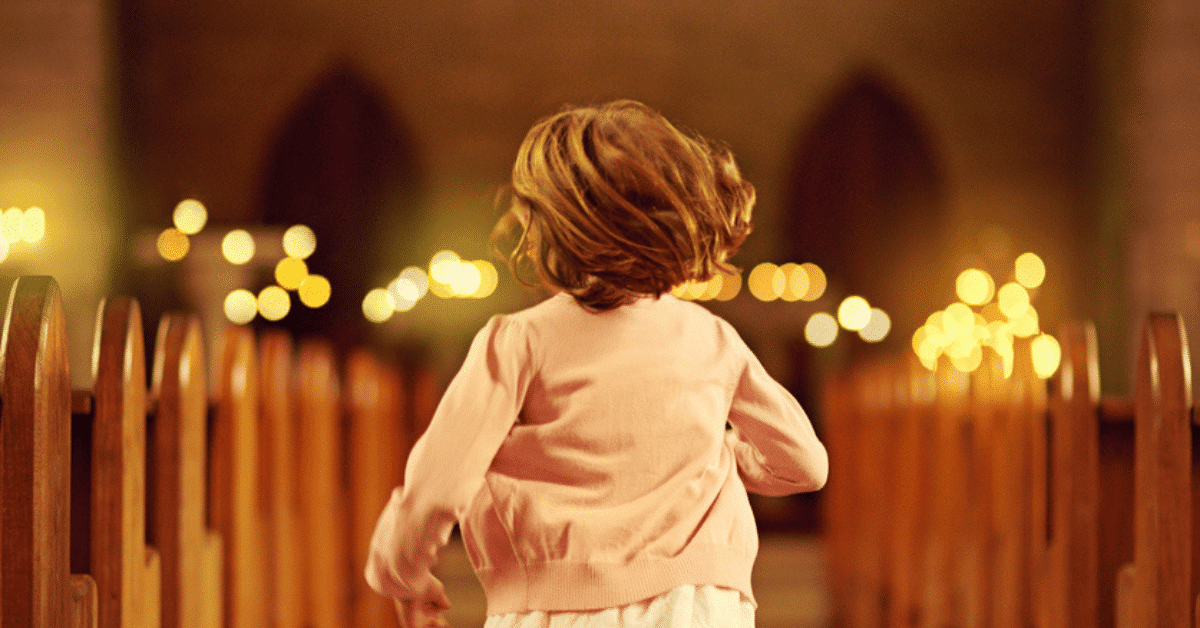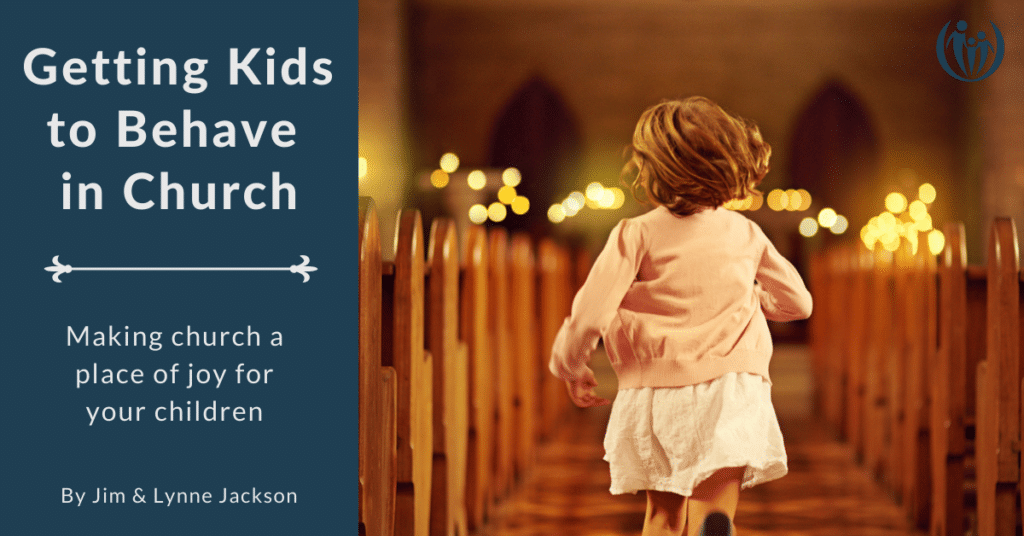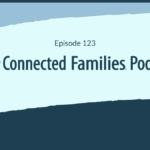
Getting Kids to Behave in Church
Making church a place of joy for your children

Is church frustrating for you as a parent? If so, you are not alone! In such a public, often quiet environment, it’s easy to have a singular goal of managing your child’s noise and energy! BUT…what if your main goal is not “getting kids to behave in church”, but instead loving your children through this transition into maturity, helping them grow and build wisdom as they learn about church and about God, and that is your spiritual act of worship?
We received the following question from a mom with three active boys who, at the time, was taking our online course Discipline That Connects With Your Child’s Heart :
Our 4-year-old twins are very persistent and strong-willed. Yesterday, at church, I tried to get them to stay quiet and quit climbing on the pews but they wouldn’t stop! Church is one of the hardest places for us. Before church, we explain our expectations and offer incentives, but it is still a frustrating, continual problem for us. We try to get them to comply while we all work hard to stay quiet. It is so stressful!
Can you relate to this struggle?
It’s awesome when parents want to experience church together with their family! However, if all church means to kids is a place to go where they get in trouble or are tightly controlled, they will likely learn to dislike church in a hurry.
Here are some perspectives and ideas using the Connected Families Framework. For starters, our overarching suggestion is to do whatever is needed so that your kids find church to be a place of joy.
Want to learn more?
Check out, “How Jesus Meets Us In Distraction” written by Connected Families Certified Parent Coach, Taylor Irby.
FOUNDATION (“You are safe with me.”)
The key question to consider is, “What’s going on in me about this issue?” How do your thoughts, feelings, and opinions of others affect your responses? And what do your kids see in you at times like this? Most parents admit that their facial expressions and body language show their kids that church is more of a chore than a joy.
If this describes your family, it may help to remember that Jesus loved hanging out with the messiest of people. When the disciples rebuked people for bringing children to Him (presumably, the kids were not acting like little adults in the meeting!) Jesus said, “Let them come to me for this is what the kingdom of heaven is like.” (Matthew 19:13) Maybe the kingdom of heaven is not a place where kids have to sit still for an hour but instead a place of grace and acceptance for all who come!
Remembering God’s mercy for your messiness in the midst of liveliness can help you create a safe environment for your children to learn and grow at church. When you model that church is a safe and joyful place, your kids can learn to see it that way too!
CONNECTION (“You are loved no matter what.”)
To truly understand and empathize, ask yourself, “What’s it like to be my child right now?”. Active or “strong-willed” children tend to have more sensitive nervous systems and find church more over-stimulating than other children might. If this is the case, these kids will often seek extra activity/movement/noisiness to help them feel more in control and less overwhelmed. This can feel disrespectful or defiant to adults, but it might just be your child’s way of compensating for the stress of the church environment.
Do your lively little ones know that you understand how hard it is for them to sit still and listen to something they don’t understand when their bodies are driven to move? How might you sincerely empathize with them?
OR, does it seem like your child is seeking attention? Another question to consider is, “Am I meeting my child’s God-given need for attention before we get into church, or do we stressfully fly into the service with my kids suffering from ‘attention deficit’?” Read about how to help prevent misbehavior with quick, intense, joy-filled attention.
COACH (“You are called and capable.”)
An important question here is, “How could I set my child up for success rather than wait for them to fail?” You can discuss this with your kids and make a plan together. As you do this, consider what your unique child might need in order to have the best shot at staying reasonably calm during church.
A creative child might benefit from activity books that have biblical messages. A tactilely sensitive child might benefit from a back rub or some putty, pipe cleaners, etc., to fidget with. A “mover and shaker” might do best with strong movement first. You can run into church from the far side of the parking lot and/or march up and down some stairwells before the service. Would it even work to stand in a back corner and move and dance a bit as you worship?
You might also consider having your child serve in church alongside you (nursery, ushering, handing out programs, etc.). One of our restless ADHD kiddos thrived when he teamed up with a creative friend of ours to help him do skits for a younger class. Serving often brings a sense of belonging and value to your child, which can be motivating, while keeping them more active than sitting in a pew.
The ultimate goal is NOT to have quiet kids for one hour, but rather that they enjoy learning, serving, and worshiping together with the body of Christ.
CORRECT (“You are responsible for your actions.”)
If you’ve tried some of these ideas and the kids are still struggling, it’s okay to find other options outside the sanctuary. The message is: church is a wonderful privilege, and we are responsible to make sure those around us aren’t distracted from learning and worshiping.
Some parents go into the lobby and let the kids roam a little more freely. Some find churches that are more intentional about engaging the younger kids. Some churches have rooms for parents and kids to be together in ways that don’t disrupt the larger service. Most churches want children to enjoy coming as much as you do! If you are at a loss for ideas, you could also seek out the children’s pastor at your church– they are trained in these things. 🙂
Putting it all together: One mom’s story
If you’ve ever had kids out of control in church (think flying crayons), you’ll relate to this entertaining story below! Mary shared her story and concluded, “The Connected Families Framework is so helpful and has given us so much hope.”
Our children Andy (5) and Kate (4) began attending the first 20 minutes of “big church” with us recently. Our church is pretty formal and traditional, and my son Andy especially struggles. (He’s the 0 to 10 child!) Most of the time, I sit on the edge of the pew, just waiting for them to be dismissed.
One Sunday, when my husband was gone, it was a full-on disaster! Unfortunately, we sat close to a ledge that became the perfect launching platform for jumping. My son also started hurling crayon missiles into the pews in front of us. My blood was boiling, and my cheeks were red with embarrassment. Andy would look at me and dangle his toe off the ledge, and I’d say, “No sir, you may NOT do that!” and then he’d give me a smirk and start jumping. This happened over and over until the last song when Kate joined in, jumping and twirling all around. I wanted to hide! It didn’t matter how many looks, arm squeezes, or threats I gave that morning; they didn’t listen.
At this point, I was in flight or fight, and I wanted to bolt out with both of them in tow, but I was more afraid of the commotion that might cause! It felt like hours for the call to dismiss them. I stood up and marched right out with my kids. They looked at me with confusion, and I said, “You aren’t going to children’s church; we’re going home.”
Not a word was spoken as we walked to the car. I took some deep breaths to gather myself, fight back tears and come up with a game plan. When they asked why we were leaving, I wanted to say, “Because you don’t know how to behave in church! Y’all were terrible this morning, and you know better!” Or “I am embarrassed and disappointed by how you acted!” I thought about all the privileges they should lose or the consequences I could hand out.
FOUNDATION
But I heard that voice, maybe it was the Holy Spirit, but also the principles from the Connected Families Framework. It was, “How can these children behave well in church if their only teaching was, ‘You need to behave!’?” I remembered my parent coach taught me that practice with “do-overs” helps kids to learn and do better the next time they are in the same situation. I was also convicted by my response. The embarrassment I was feeling was about what my peers thought of my parenting. I was allowing my children to define my worth when I felt out of control and helpless. Thankfully I had the car ride home to think through all this.
CONNECT
When we got home, I turned to the kids and told them how much I loved them!
COACH
I explained, “We need some practice with how we participate in church so others can pay attention. Church is where we try to keep our hands and legs to ourselves and listen with our best listening ears. The trampoline park is where we can wiggle, jump, dance, and even talk very loudly!”
CORRECT
I got the Bluetooth speaker, my Bible, and the bulletin from the service, and we had our do-over practice rounds! We went through every single line item, sang the same exact worship songs, and I taught the kids how to follow along in the bulletin. We made it fun and practiced several times until we could do it correctly. Even Andy smiled and enjoyed it.
The following week we went to church and put our practice into action. I was amazed! Andy was really engaged. He followed along intently with his bulletin and stood when it was time to sing. No flying crayons, no jumping around! When they dismissed the kids, he put his bulletin in my purse and hugged me, “Mom, I think having the bulletin really helped me!”
It was so fun to celebrate this moment where discipline truly connected our entire family. We could have missed the opportunity by sticking with our ways, but it turned into an incredible teaching moment and experience for all of us!
I (Lynne) reconnected with Mary several years later. Of course, this experience didn’t turn her extremely lively children into consistently compliant, calm, hymn-singing angels, but it’s been better. Here is the update she gave me:
Shifting my mentality to “it’s not about me” has helped me grow in compassion and empathy toward their struggles with sitting still. Per your suggestion, I’ve allowed Andy to excuse himself to go and run up and down the stairs or get a sip of water. This has been helpful!
Some Sundays are much better than others, and on those days, we give lots of praise and encouragement. We’ve also shared our struggles with our pastors and friends, and they are all very supportive and encouraging.
It’s still a struggle most Sundays, even now when they are 8 and 7. But my heart has changed, and I guess that’s what counts!
It is what counts! Children probably won’t remember many of the specific things they learn at church, but they will remember how they feel at church. You can make it a goal for your kids to feel like those children felt when Jesus pulled them onto his lap!

Do you have a child with EXTRA needs?
Parenting isn’t easy, but when you’ve got an extra INTENSE or SENSITIVE child with big feelings… it’s even harder.
The Sensitive and Intense Kids online course will equip you to parent well, even with these unique kiddos.




